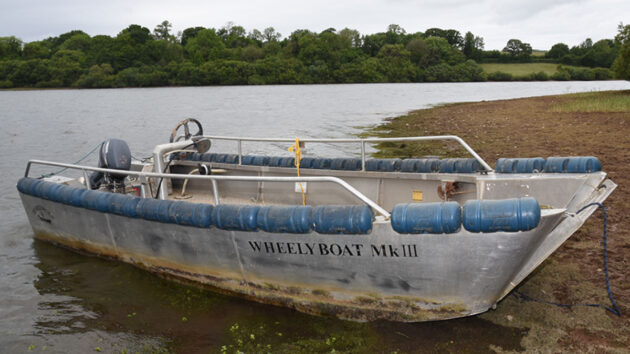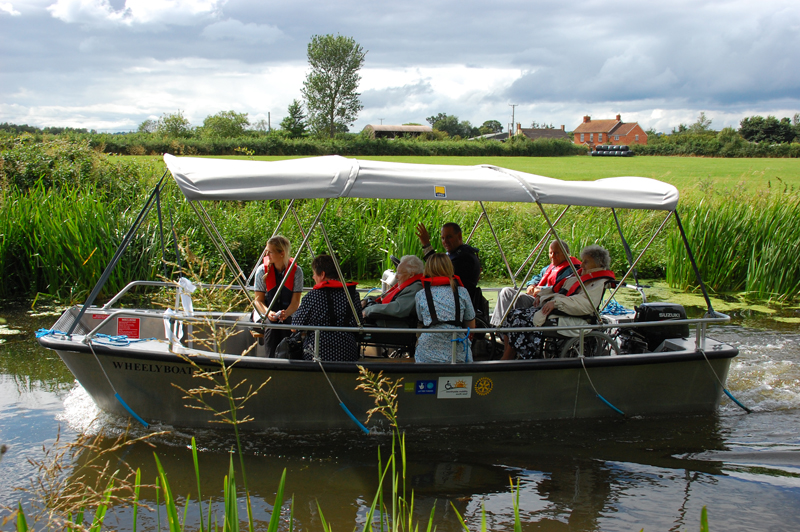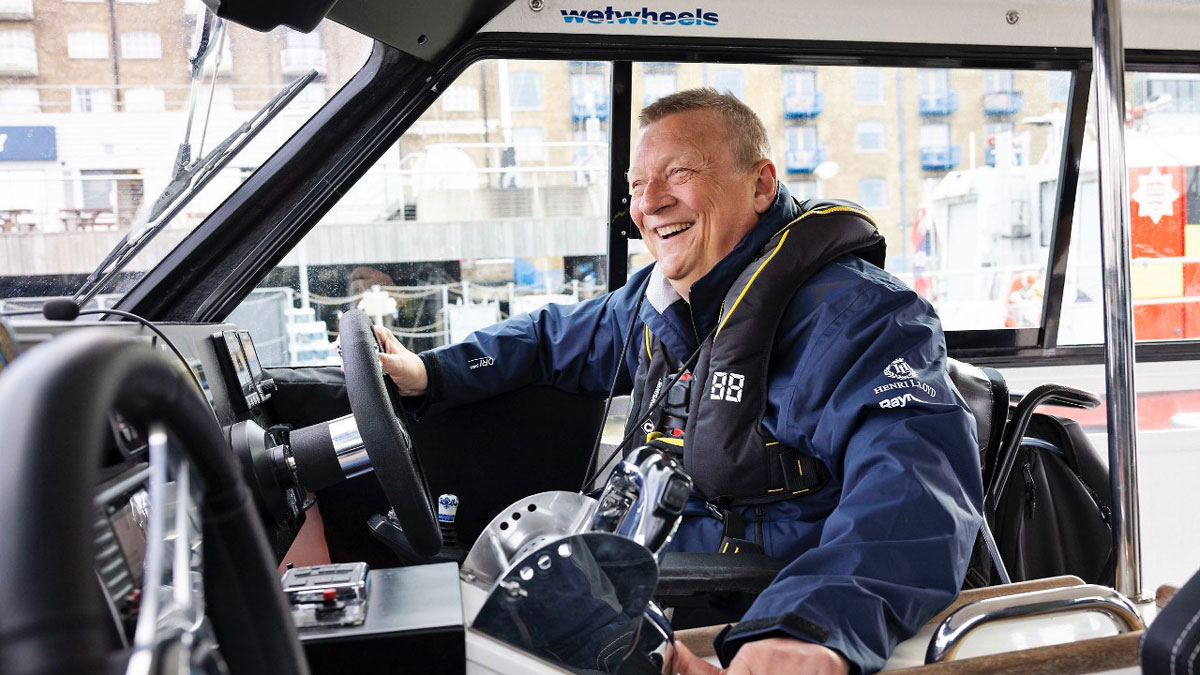A "catalogue of failings" and a "worrying lack of oversight" have been highlighted by an MAIB investigation into a double fatality that occurred when a Mk III Wheelyboat capsized on Roadford Lake, Devon.
The investigation into the deaths of two Wheelyboat passengers, who drowned after the vessel capsized on Roadford Lake, Devon, found that the boat was leaking and poorly maintained.
Alison Tilsley and Alex Wood, residents from a local care home, were on a trip around the lake when the Mk III Wheelyboat 123 capsized on 8 June 2022.
They had been strapped into their motorised wheelchairs and “rapidly” sank to the bottom of the lake when they were “thrown into the water” during the capsize and could not be rescued.
Investigators from the Marine Accident Investigation Branch (MAIB) found that the wheelyboat had not been correctly maintained, allowing water to leak into the boat and making it unstable, which led to its capsize. The bow ramp seals were not subjected to regular inspection before use and had degraded, compromising the watertight integrity of the wheelyboat.
At the time of the capsize, a carer, boat driver and three residents from Burdon Grange care home were on board the 5.3m aluminium open boat.
Ms Tilsley and Mr Wood had been strapped into their motorised wheelchairs “for their personal safety”, however the report states: “neither the activity centre nor Burdon Grange had considered the risks that this introduced to their excursion on Wheelyboat 123.”

Alex Wood’s motorised wheelchair was positioned on the centreline of the boat, while Alison Tilsley’s motorised wheelchair was directly in front – (resident 1 and resident 2). Credit: MAIB report
Investigators found that: “Resident 1 and resident 2 were strapped into their wheelchairs and died as a result of the capsize.
“Resident 3, who was unsecured in their [manual] wheelchair, was rescued and survived. Secured to a heavy wheelchair, and with a total combined weight far greater than the buoyancy afforded by their buoyancy aids, the two residents sank quickly.
“There was no opportunity for anyone to release them from their wheelchairs and neither resident had the capability to release themselves. Their chances of survival when they sank were nil.”
The third resident, who was recovered from the water, from under the upturned Wheelyboat, was saved by an instructor. The instructor carried out cardiopulmonary resuscitation (CPR) in the rescue rigid inflatable boat (RIB) and got them breathing again.
They were transported ashore and taken to hospital by ambulance.

Aerial view over Roadford Lake, Devon. Credit: Adam Burton/robertharding/Alamy
Key safety issues
The MAIB investigation identified the following key safety issues:
- the watertight integrity of the bow ramp seal had degraded
- the wheelyboat capsized when water accumulated on the deck
- the risks of strapping wheelchair users in their chairs were neither considered nor mitigated
- both the activity centre and the care home assumed the other had knowledge about managing the activity for disabled people.
Chief inspector of marine accidents, Andrew Moll OBE, said: “Trips on the wheelyboat were beneficial for the continuing wellbeing and therapy of the residents of the care home; however, no-one had taken time to properly consider the risks associated with taking the wheelchair users afloat, either before the accident or on the day itself.
“The condition of the wheelyboat had been allowed to deteriorate so water could enter it, and on the day no-one recognised the implications of carrying vulnerable people who were strapped into heavy motorised wheelchairs around a lake in an open boat. In short, no-one had their eye on the risk, and tragically Alison Tilsley and Alex Wood lost their lives.
“As well as the catalogue of failings highlighted by the report, the investigation has also uncovered a worrying lack of oversight which must be seen as an impetus for urgent action.
“Charitable activities such as this seem to fall into a grey zone with no organisation or authority in a position of oversight. This meant that no-one stepped in to question what had become custom and practice. Addressing this is not simple and may only be possible with a change in the law; however, the current situation is not something that should be tolerated.”

Roadford Lake Country Park in Devon, England Credit: csimagebase/Alamy
What happened?
The Wheelyboat 123 capsized when the driver prepared to make a turn to port to bring the boat back to shore; spray was coming over the gunwales and a carer seated on the port side observed “a large quantity of water coming over the side of the boat into the port forward corner and alerted the driver.
“The boat started to heel to port with the bow angled down. The driver stood up from their helm seat to see what had happened and, as they did so, the motorised wheelchairs slid towards the port side of the boat and Wheelyboat 123 capsized,” the MAIB report found.
A rescue boat was launched and the emergency services were contacted. The driver and carers were assisted, along with the third care home resident, but despite search efforts that continued into the evening, Ms Tilsley and Mr Wood were not recovered until the following day.
The Wheelyboat Trust said that the Mk III Wheelyboat involved in the accident was operated and maintained by the South West Lakes Trust, and as with all vessels it supplies, the ongoing maintenance and operation is down to the boat’s operator.
In a statement, the Trust said: “A serious incident involving a Mk III Wheelyboat, operated and maintained by South West Lakes Trust, took place in Devon in June 2022 where, tragically, two people lost their lives.
“Our heartfelt sympathies and condolences remain with the families and friends of those who died.
“We have co-operated fully with the MAIB throughout their investigation and acknowledge their report and note that they did not find that the design of the vessel involved contributed to the incident.
“We will be immediately reviewing the recommendations coming out of the report to ensure that our guidance and processes are updated to reflect any changes required.
“As there are still ongoing investigations by the authorities, it would not be appropriate for us to comment further at this time.”
The chief executive of the South West Lakes Trust, James Platts said: “We welcome the publication of this report and recognise that its aim is not to assign blame or liability, but to improve water safety and ensure, as far as possible, that future accidents are prevented.
“We are reviewing the report thoroughly and will be implementing the applicable recommendations accordingly.
“We continue to operate our other activities under the accreditation of the Royal Yachting Association and the Adventure Activities Licensing Authority.
“Whilst we immediately ceased the use of Wheelyboats on our waters following the incident, we recognise the benefits vessels of this type provide to those with disabilities and will consider the future operation of such vessels in the context of the recommendations.
“It would be inappropriate for us to comment further while other investigations continue.
“Our thoughts remain with those affected by this tragedy, their friends and family.”

Buoyancy aid used on the day. Credit: Devon & Cornwall Police
Report safety recommendations:
The Local Government Association is recommended to:
- Bring the report and safety issues to the attention of local authorities and to consider the role of local government in overseeing waterborne charitable activities.
South West Lakes Trust is recommended to:
- Update the planned maintenance system used by its activity centres to include the specific maintenance tasks required by the manufacturers of the watercraft they operate, including boats used by disabled people.
- Employ a permanent member of staff dedicated to the maintenance and condition monitoring of all activity centre craft.
- Train and educate instructing staff and any support staff in disability awareness through the attendance of recognised disability awareness training.
- Ensure instructors at its activity centres are educated in how to evaluate the weight and load distribution for users of craft designed for wheelchair users to ensure compliance with the design loading and manufacturer’s instruction.
- Revise driver assessment requirements for craft designed for wheelchair users to ensure drivers are equipped to recognise developing dangerous situations and take emergency action.
Burdon Grange care home is recommended to:
- Revise its risk assessments for activities provided by organisations outside of the care home environment to identify any hazards faced by the residents taking part in that activity and take steps to assure itself that appropriate risk mitigation measures are in place.
The Wheelyboat Trust is recommended to:
- Review the wheelyboat owner’s manual to ensure that guidance around wheelchair securing and the carriage of heavy, motorised wheelchairs is appropriate.
- Remind operators of wheelyboats supplied under a placement agreement of the need to submit annual condition notes and take action to ensure wheelyboats are being maintained in line with the owner’s manual and The Wheelyboat Trust’s requirements.
Wheelchair accessible Wheelyboat launched
Enabling disabled people to enjoy boat trips along the Bridgwater and Taunton Canal
Geoff Holt completes his ‘finishing the dream’ circumnavigation
After 25 days at sea, circumnavigating the UK coastline, quadriplegic adventurer Geoff Holt and his team have returned to St.…
‘Lessons will be learned’
A separate charity, which also enables disabled people to experience the thrill of being afloat by securing wheelchairs to a boat, is the Wetwheels Foundation.
Chairman Trevor Phillips said: “We have considered the MAIB report into the fatalities on Wheelyboat 123 on Roadford Lake in Devon in June 2022; and our thoughts are with all those affected by this tragic incident.
“Safety of our participants has, and always will be, paramount for our activities. Wetwheels operates a fleet of Cheetah Marine catamarans designed for open water, and they were chosen for their inherent stability. They have substantial reserves of buoyancy.
“All our activities are underpinned by Standard Operating Procedures (SOPs) that have been reviewed by the Maritime and Coastguard Agency. The MCA, having assessed our SOPs, stated that they ‘…consider Wetwheels to be the subject matter experts at taking people with disabilities to sea’.
“These SOPs ensure the safe operation of our boats, including staff and volunteer training; safety briefing; lifejackets; boat specification and a regular programme of maintenance.
“When under way, all wheelchairs are secured to the deck of a Wetwheels boat. Crew and carers are fully briefed about how to release a wheelchair occupant in the event of an emergency situation.
“All Wetwheels skippers hold a commercially endorsed qualification and, with all crew, they are also trained in disability awareness in a marine environment.
“As part of our ongoing commitment to safety the Board of Trustees of Wetwheels Foundation are reviewing all the recommendations from the MAIB report to see if there is anything we can learn from this tragic incident.”






